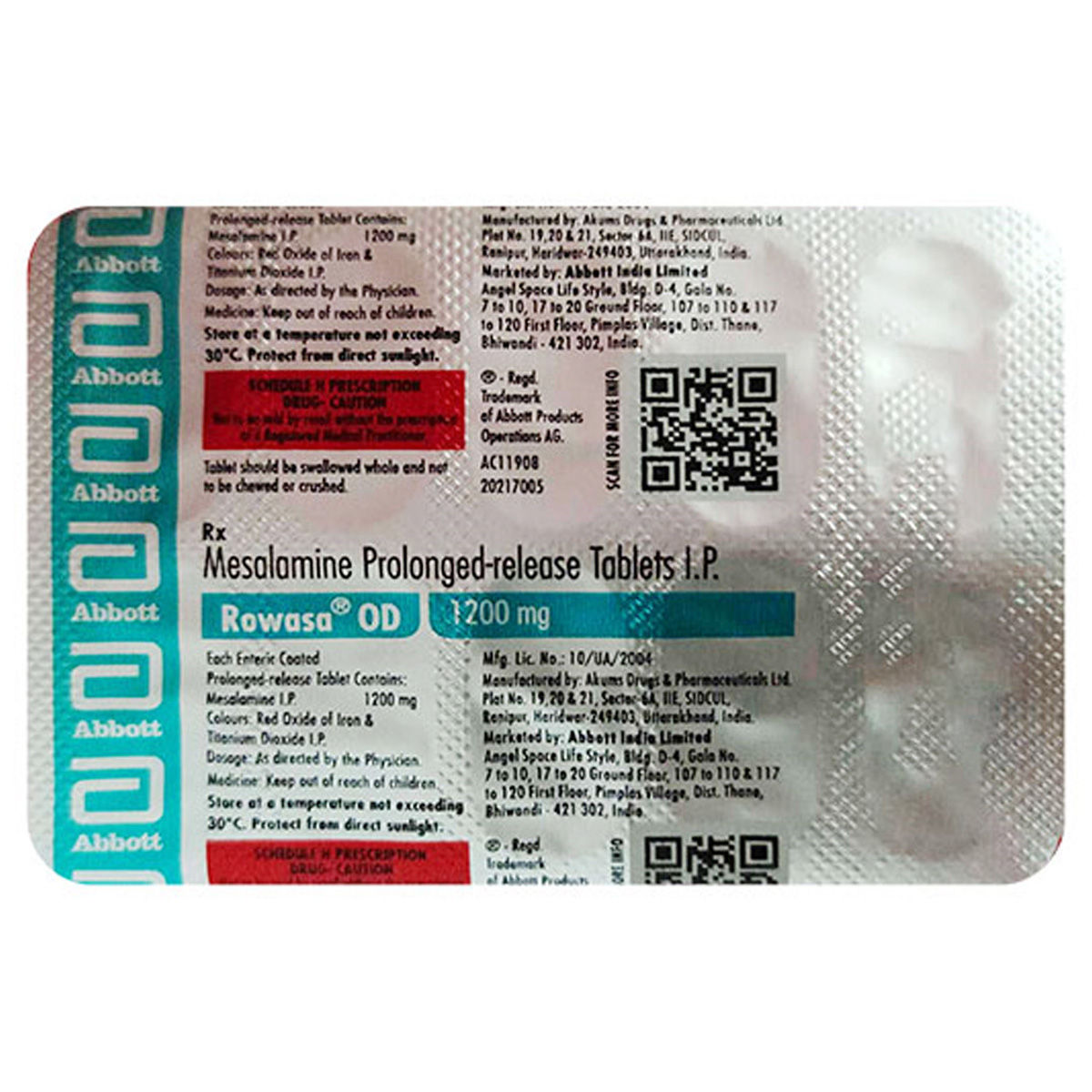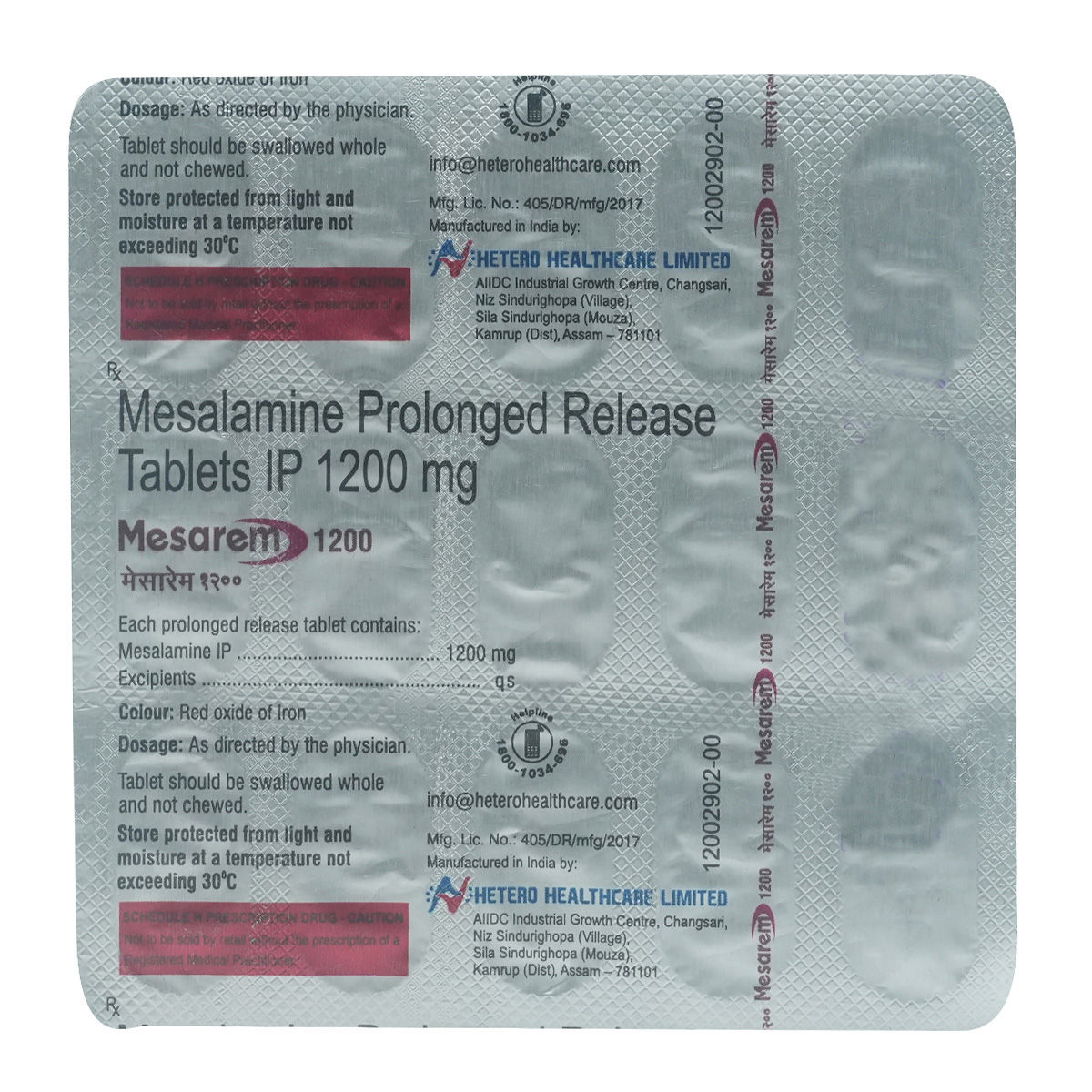Medasa 1.2 gm Tablet 15's

₹413.1*
MRP ₹459
10% off
₹390.15*
MRP ₹459
15% CB
₹68.85 cashback(15%)
Free Delivery
With Circle membership
(Inclusive of all Taxes)
This offer price is valid on orders above ₹800. Apply coupon PHARMA10/PHARMA18 (excluding restricted items)
Medasa 1.2 gm Tablet is used to treat Ulcerative colitis and Crohn's disease. It contains Mesalazine, an anti-inflammatory drug. It works by inhibiting the production of certain chemical substances, such as prostaglandins, that cause pain and swelling. This helps reduce inflammation (redness and swelling) in the intestines and relieves stomach pain or bleeding symptoms. Also, it may prevent further episodes of ulcerative colitis.
Know Your Delivery Time
Provide Delivery Location
Available Offers
 Prescription drug
Prescription drugWhats That

Secure Payment

India's Most Trusted Pharmacy

Genuine Products
Composition :
Manufacturer/Marketer :
Consume Type :
Return Policy :
Expires on or after :
About Medasa 1.2 gm Tablet
Medasa 1.2 gm Tablet belongs to a class of drugs called 'anti-inflammatory drugs used to treat ulcerative colitis and Crohn’s disease. Ulcerative colitis is a type of chronic inflammatory bowel disease that causes inflammation of the large intestine lining (colon). It produces ulcers on the colon's lining, which may cause bleeding and discharge of pus and mucus.
Medasa 1.2 gm Tablet contains Mesalazine, which works by inhibiting the production of certain chemical substances, such as prostaglandins, that cause pain and swelling. Thereby, it reduces inflammation (swelling) in the intestines and provides relief from symptoms such as stomach pain or bleeding.
Take Medasa 1.2 gm Tablet as prescribed. You are advised to use Medasa 1.2 gm Tablet for as long as your doctor has recommended it for you based on your medical condition. In some cases, you may experience diarrhoea, stomach pain, headache, nausea, vomiting or flatulence (gas). Most of these side effects of Medasa 1.2 gm Tablet do not require medical attention and gradually resolve over time. However, if the side effects persist or worsen, please consult your doctor.
Avoid taking Medasa 1.2 gm Tablet if you are allergic to Mesalazine or any other medicines. Medasa 1.2 gm Tablet should be used with caution in the elderly. If you are pregnant or breastfeeding, please inform your doctor before taking Medasa 1.2 gm Tablet . Avoid taking Medasa 1.2 gm Tablet if you have severe kidney failure. If you have stomach pain or cramps, severe headache, fever or rash, stop taking Medasa 1.2 gm Tablet immediately and consult a doctor.
Uses of Medasa 1.2 gm Tablet
Directions for Use
Swallow the tablet as a whole with a glass of water. Do not crush, chew or break it.
Medicinal Benefits
Medasa 1.2 gm Tablet contains Mesalazine, an anti-inflammatory drug used in the treatment of ulcerative colitis and Crohn’s disease. It works by inhibiting the production of certain chemical substances, such as prostaglandins, that cause pain and swelling. Thereby helping in reducing inflammation (redness and swelling) in the intestines and providing relief from symptoms such as stomach pain or bleeding. Also, Medasa 1.2 gm Tablet may prevent further episodes of ulcerative colitis.
How Medasa 1.2 gm Tablet Works
Storage
Side Effects of Medasa 1.2 gm Tablet
- Diarrhoea
- Stomach pain
- Headache
- Nausea
- Vomiting
- Flatulence (gas)
Drug Warnings
If you are allergic to Mesalazine or any other medicines, please tell your doctor. Medasa 1.2 gm Tablet should be used with caution in the elderly. If you are pregnant or breastfeeding, please inform your doctor before taking Medasa 1.2 gm Tablet . Avoid taking Medasa 1.2 gm Tablet if you have severe kidney failure. Severe skin reactions such as toxic epidermal necrolysis (skin peeling and blistering) or Stevens-Johnson syndrome (a painful rash that spreads and blisters) can occur in some patients taking Medasa 1.2 gm Tablet . Therefore, if you notice any skin reactions while taking Medasa 1.2 gm Tablet , please consult a doctor immediately. If you have stomach pain or cramps, severe headache, fever or rash, stop taking Medasa 1.2 gm Tablet immediately and consult a doctor. Avoid taking Medasa 1.2 gm Tablet if you have had blood abnormalities or kidney problems while taking other medicines such as Sulphasalazine.
Drug-Drug Interactions
Drug-Drug Interactions
Login/Sign Up
Co-administration of Medasa 1.2 gm Tablet with Cidofovir can increase the risk of kidney problems.
How to manage the interaction:
Taking Medasa 1.2 gm Tablet with Cidofovir is generally avoided as it can possibly result in an interaction, it can be taken if a doctor has advised it. However, if you experience increased or decreased urination, sudden weight gain or loss, shortness of breath, consult a doctor. Do not discontinue any medications without consulting a doctor.
Co-administration of Metrizamide with Medasa 1.2 gm Tablet may increase the risk of kidney problems.
How to manage the interaction:
Although, there is a possibility of interaction between Medasa 1.2 gm Tablet with Metrizamide they can be taken together if a doctor has prescribed them. Consult a doctor immediately if you experience any symptoms such as swelling in feet and ankles, dry, itchy skin, urinating either too much or too little. Do not discontinue any medication without consulting a doctor.
Co-administration of Ranitidine with Medasa 1.2 gm Tablet can decrease the levels of Medasa 1.2 gm Tablet, which may be less effective in treating a condition.
How to manage the interaction:
There may be a possible interaction between Medasa 1.2 gm Tablet with Ranitidine, but they can be taken together if a doctor has prescribed them. Do not discontinue any medications without consulting a doctor.
Co-administration of Iomeprol with Medasa 1.2 gm Tablet may increase the risk of kidney problems.
How to manage the interaction:
Although, there is a possibility of interaction between Medasa 1.2 gm Tablet and Iomeprol they can be taken together if your doctor has prescribed them. Consult a doctor immediately if you experience any symptoms such as swelling in feet and ankles, urinating either too much or too little. Do not discontinue any medication without consulting a doctor.
Co-administration of Iodamide with Medasa 1.2 gm Tablet may increase the risk of kidney problems.
How to manage the interaction:
Although, there is a possibility of interaction between Mesalamine with Iodamine they can be taken together if a doctor has prescribed them. Consult a doctor immediately if you experience any symptoms such as swelling in feet and ankles, itchy skin, shortness of breath, urinating either too much or too little. Do not discontinue any medication without consulting a doctor.
Co-administration of Nizatidine with Medasa 1.2 gm Tablet can decrease the level or effect of Mesalamine by increasing gastric pH.
How to manage the interaction:
Although there may be a possible interaction between Medasa 1.2 gm Tablet with Nizatidine, they can be taken together if a doctor has prescribed them. Do not discontinue any medications without consulting a doctor.
Co-administration of omeprazole with Medasa 1.2 gm Tablet can decrease the effects of Medasa 1.2 gm Tablet.
How to manage the interaction:
There could be a possible interaction between Medasa 1.2 gm Tablet and omeprazole, but they can be taken together if a doctor has prescribed them. Do not discontinue any medications without consulting a doctor.
Co-administration of Deferasirox with Medasa 1.2 gm Tablet may increase the risk of kidney problems.
How to manage the interaction:
Although there is a possibility of interaction between Medasa 1.2 gm Tablet and Deferasirox but they can be taken together if a doctor has prescribed them. Consult a doctor immediately if you experience any symptoms such as increased or decreased urination, abrupt weight gain or loss, weakness, or dizziness. Do not discontinue the medication without consulting a doctor.
Co-administration of Tenofovir alafenamide with Medasa 1.2 gm Tablet may increase the risk of kidney problems.
How to manage the interaction:
There is a possibility of interaction between Medasa 1.2 gm Tablet with Tenofovir alafenamide, but they can be taken together if a doctor has prescribed them. Consult a doctor immediately if you experience increased or decreased urination, swelling, shortness of breath, bone pain, cramping in the muscles. Do not discontinue the medication without consulting a doctor.
Drug-Food Interactions
Drug-Food Interactions
Login/Sign Up
Diet & Lifestyle Advise
- Maintain a low-fat diet and eat foods rich in vitamin C, such as bell peppers, spinach, parsley and berries, which help in healing faster.
- Include olive oil and omega-3 fatty acids. Eat more fibre-rich foods such as fruits and vegetables.
- Limit dairy intake as your body may develop difficulty digesting certain dairy products when you are affected with Crohn’s disease, which leads to stomach cramps, diarrhoea or stomach upset.
- Drink plenty of water to prevent dehydration.
Habit Forming
Therapeutic Class
Medasa 1.2 gm Tablet Substitute

Vegaz OD 1.2 gm Tablet 15's
by Others
₹44.91per tabletVersames 1200 Tablet 10's
by Others
₹34.65per tabletVegaz OD Tablet 10's
by Others
₹40.82per tabletRowasa OD 1200 Tablet 10's
by Others
₹27.00per tabletMesalo OD Tablet 10's
by AYUR
₹31.86per tablet
Product Substitutes
Alcohol
Consult your doctor
The interaction of alcohol with Medasa 1.2 gm Tablet is unknown. If you have concerns, please discuss them with your doctor before taking Medasa 1.2 gm Tablet .
Pregnancy
Consult your doctor
Medasa 1.2 gm Tablet is a Category B pregnancy drug and is given to pregnant women only if the doctor thinks the benefits outweigh the risks. Please consult your doctor if you are pregnant or planning for pregnancy before taking Medasa 1.2 gm Tablet .
Breast Feeding
Caution
Medasa 1.2 gm Tablet should not be taken by breastfeeding mothers unless advised by the doctor. Granules form of Mesalazine may cause allergic reactions such as diarrhoea in newborn babies after breastfeeding. If this happens, discontinue breastfeeding.
Driving
Safe
Medasa 1.2 gm Tablet usually does not affect your ability to drive or operate machinery.
Liver
Consult your doctor
Please consult your doctor if you have liver problems before using Medasa 1.2 gm Tablet .
Kidney
Caution
Medasa 1.2 gm Tablet should be used with extreme caution in patients with mild to moderate kidney impairment. Avoid taking Medasa 1.2 gm Tablet if you have severe kidney impairment.
Children
Caution
Medasa 1.2 gm Tablet is not recommended for children below two years. However, Medasa 1.2 gm Tablet should be given to children only if recommended by a doctor.
FAQs
Medasa 1.2 gm Tablet is used to treat Ulcerative colitis and Crohn's disease.
Medasa 1.2 gm Tablet contains Mesalazine, which works by inhibiting the production of certain chemical substances, such as prostaglandins, that cause pain and swelling. Thereby helps in reducing inflammation (swelling) in the intestines and provides relief from symptoms such as stomach pain or bleeding.
You are not recommended to take Medasa 1.2 gm Tablet with Ibuprofen as co-administration of these two medicines may increase the risk of kidney problems. However, please consult your doctor before taking Medasa 1.2 gm Tablet with other medicines.
Yes, Medasa 1.2 gm Tablet may cause kidney stones in some patients. It is not necessary for everyone taking Medasa 1.2 gm Tablet to experience this side effect. However, if you notice blood in urine or pain in the sides of the stomach, please consult a doctor immediately. Drink adequate water while taking Medasa 1.2 gm Tablet to prevent kidney stones.
Medasa 1.2 gm Tablet should be used with caution in patients with stomach ulcers as it may increase the risk of worsening the condition. Therefore, please inform your doctor if you have a stomach ulcer before taking Medasa 1.2 gm Tablet .
Yes, Medasa 1.2 gm Tablet may cause diarrhoea as a common side effect. However, if the condition persists and worsens with fever, watery stools or consistent stomach pain, please consult a doctor. Also, drink plenty of water while taking Medasa 1.2 gm Tablet to prevent dehydration.
Country of origin
Manufacturer/Marketer address
Disclaimer
Author Details
We provide you with authentic, trustworthy and relevant information
















